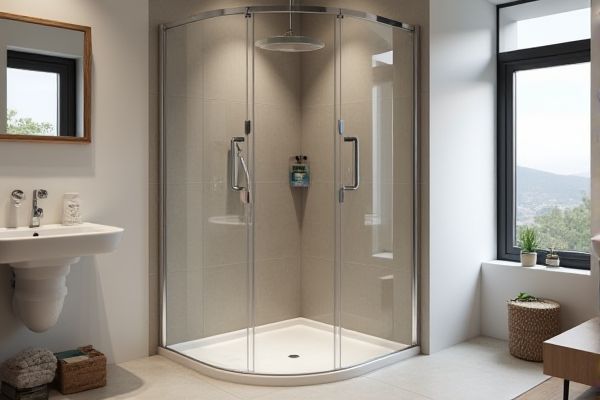
Fixed panel shower screens offer a sleek, space-saving design ideal for smaller bathrooms by remaining stationary and preventing water splashes effectively. Your choice between a fixed panel and a hinged shower screen depends on bathroom layout and access needs; explore the article to find out which option best suits your lifestyle.
Table of Comparison
| Feature | Fixed Panel Shower Screen | Hinged Shower Screen |
|---|---|---|
| Design | Stationary glass panel | Glass panel with pivot hinge |
| Space Efficiency | Requires more space for splash area | Saves bathroom space with door swing |
| Access | Limited entry width | Wide and easy access |
| Installation | Simple and low cost | Complex, higher cost |
| Maintenance | Easy to clean, fewer moving parts | Requires hinge maintenance, more cleaning effort |
| Water Containment | Good splash protection, minimal leaks | Effective sealing but potential hinge gaps |
| Durability | High - no moving parts | Moderate - hinges prone to wear |
| Cost | Generally lower | Generally higher |
Introduction to Fixed and Hinged Shower Screens
Fixed panel shower screens offer a sleek, minimalist design with a stationary glass panel that provides easy access and low maintenance. Hinged shower screens feature a door that swings open, allowing for flexible entry and enhanced bathroom space optimization, ideal for smaller or irregular shower areas. Your choice depends on your bathroom layout and preference for accessibility or streamlined aesthetics.
Design and Aesthetic Differences
Fixed panel shower screens offer a sleek, minimalist design with clean lines that enhance modern bathroom aesthetics, creating an open and airy feel. Hinged shower screens provide a versatile and dynamic look, allowing the door to swing open for easy access while adding a subtle architectural element to the space. Your choice depends on whether you prefer a streamlined appearance or functional elegance that complements your bathroom layout.
Space Requirements and Bathroom Layout
Fixed panel shower screens require minimal space due to their stationary design, making them ideal for smaller bathrooms or compact layouts. Hinged shower screens need extra clearance for door movement, which can impact the overall bathroom layout and limit placement options. You should consider your available space carefully to determine which screen enhances both functionality and flow in your bathroom.
Installation Process and Complexity
Fixed panel shower screens offer a straightforward installation process, requiring secure wall mounting and sealing to prevent water leakage, making them ideal for DIY enthusiasts seeking simplicity. Hinged shower screens involve more complex installation due to the need for precise alignment of the door hinges and ensuring smooth operation, often requiring professional assistance to guarantee a watertight seal and proper functionality. Your choice depends on whether you prefer a quick, less complicated setup or a more versatile, but intricate, installation.
Ease of Cleaning and Maintenance
Fixed panel shower screens offer easier cleaning and maintenance due to their simple, stationary design with fewer moving parts, reducing the accumulation of grime and mold in hinges or joints. Hinged shower screens require more attention to keep hinges lubricated and free from soap residue, which can impair smooth operation and increase cleaning time. Smooth surfaces and minimal crevices in fixed panels contribute to quicker maintenance and enhanced hygiene.
Durability and Longevity
Fixed panel shower screens offer superior durability due to their simple construction and absence of moving parts, reducing wear and tear over time. Hinged shower screens, with their swinging mechanism, require regular maintenance to prevent hinge corrosion and ensure smooth operation. Glass thickness and high-quality hardware in both types significantly influence their longevity, but fixed panels generally provide a longer lifespan with minimal upkeep.
Cost Comparison and Budget Considerations
Fixed panel shower screens generally offer a more cost-effective solution compared to hinged shower screens due to simpler installation and fewer moving parts, reducing maintenance expenses. Hinged shower screens tend to have higher upfront costs driven by complex hardware and the need for precise installation to ensure proper door alignment and sealing. Budget considerations should factor in long-term durability and potential repair costs, with fixed panels often favored for economical projects and hinged screens chosen for enhanced functionality despite greater investment.
Safety and Accessibility Features
Fixed panel shower screens offer enhanced safety with their sturdy, frameless design that reduces movement and risk of injury, making them ideal for users prioritizing stability. Hinged shower screens provide greater accessibility by allowing easy entry and exit through a swinging door, which can be particularly beneficial for individuals with limited mobility. Your choice depends on whether safety through rigidity or ease of access via door operation is the primary concern.
Water Containment and Splash Control
Fixed panel shower screens offer superior water containment by creating a continuous barrier that minimizes water splash beyond the shower area, making them ideal for walk-in showers with minimal gaps. Hinged shower screens provide flexible splash control by allowing the door to swing open and close, but may have small gaps around the hinges or seals, leading to occasional water leakage. Choosing between fixed and hinged screens depends on the bathroom layout and the priority placed on maximum water containment versus accessibility.
Which Shower Screen is Right for Your Bathroom?
Choosing between a fixed panel shower screen and a hinged shower screen depends on your bathroom's layout and space. Fixed panels offer a sleek, minimalist look ideal for compact areas and easy maintenance, while hinged screens provide flexibility, allowing you to open the door fully for easier access and cleaning. Assess your bathroom's dimensions and your preference for functionality to determine which shower screen best suits your daily routine.
 homyna.com
homyna.com